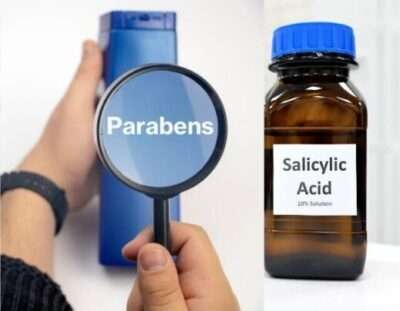Certain ingredients may not be suitable for your skin or have some adverse effects. So it is important to avoid those toxic ingredients that may not be suitable for your skin. Some of the products might be in your cabinet right now.
Nowadays, many brands are switching to natural ingredients from chemicals as many products are not suitable for everyone.
Table of Contents
Toxic Ingredients that you should avoid in any Skincare Product
The list of ingredients that you should avoid is as follows:
- Parabens
- Sulfates
- Silicones
- Phthalates
- Harsh Exfoliants
- Fragrance
- Alcohol
Let us discuss one by one in detail:
1. Parabens
Why parabens are dangerous?
Parabens are preservatives used to extend the shelf life of skincare products.
Some people are concerned about their potential hormonal disruption. A paraben is typically listed on more than one product ingredient label, and this preservative is frequently paired with a variety of other preservatives to better protect against microorganisms. Parabens cause skin sensitivities and allergies. Many products are now advertised as “paraben-free.” So it is a wise idea to choose a paraben-free product.
They are used in Sunscreen, Shaving cream, Lotion, and Face cream.
What to See on the label?
Methylparaben, propylparaben, butylparaben, and ethylparaben
2. Sulfates
Why Sulfates are Dangerous?
Sulfates, like sodium lauryl sulfate (SLS) and sodium laureth sulfate (SLES), are foaming agents that can be harsh and make the skin dry.
Some people have more acne than usual because of SLES.
They are used in Toothpaste, Shampoo, Body wash, and Hand Wash. So, next time you go to buy a body wash, choose one that is sulfate-free.
What to See on the label?
Sodium lauryl sulfate, sodium laureth sulfate, sodium dodecyl sulfate, and sodium n-dodecyl sulfate.
3. Phthalates
Why Phthalates are dangerous?
Phthalates are sometimes used as plasticizers in cosmetics and skincare products.
They are linked to endocrine disruption. They can disturb the hormonal balance in your body. Some products are labeled as “phthalate-free.” So you have an option to choose if you have any allergy to this chemical.
They are used in Nail polishes, Perfume, Shampoo, and Lotion.
What to See on the label?
Phthalate, DEP, DBP, and DEHP
4. Fragrance and Perfumes
Why Fragrance are dangerous?
Fragrances in skincare products can cause irritation and allergies in some individuals.
Look for products labeled “fragrance-free” or “unscented” to minimize the risk. A mix of synthetic ingredients or essential oils is used in skincare products.
They are mostly used in Shower gels, Shampoos, Shaving creams, and Body lotions.
What to see on the label?
Fragrance, Perfume and Aroma
5. Alcohol
Why Alcohol is not good for the skin?
The main ingredient in perfume and eau de toilette formulations is alcohol.
High concentrations of alcohol, such as denatured alcohol or ethanol, can be drying and irritating to the skin. They are used because they give a quick-drying finish and quickly degrease the skin. So, it shows an immediate effect, especially for those with oily skin.
They dry the skin, cause irritation, and can trigger rosacea flare-ups. They also prevent the absorption of Vitamin A – the lack of which promotes premature aging.
They are mostly used in Perfumes, Toners, Astringents, and Gel moisturizers.
What to see on the label?
Denatured alcohol or ‘alcohol denat’ , ethanol or ‘ethyl alcohol’, and isopropyl alcohol.
6. Silicones
Why Silicones are not Good?
Silicones like dimethicone are often used in skincare products to create a smooth texture.
While they are generally considered safe, they can be heavy and occlusive, potentially leading to clogged pores in some individuals.
They are found in the majority of Makeup and Beauty products.
What to see on the label?
Dimethicone, Cyclopentasiloxane, Dimethiconol, Phenyl Trimethicone, Amodimethicone, Cyclomethicone.
7. Harsh Exfoliants
Why Harsh Exfoliants are dangerous?
Harsh exfoliants are acids that get rid of dead skin cells and can lead to heightened irritation, redness, and long-term deterioration.
It is commonly used in any cosmetic for brightening your complexion and fading acne scars. Avoid products with harsh physical exfoliants like walnut shells or apricot pits, as they can cause microtears in the skin. Instead, opt for chemical exfoliants like AHAs (alpha hydroxy acids) or BHAs (beta hydroxy acids).
They are mostly used in Body Scrubs and Cleansers.
What to see on the label?
Salicylic acid, glycolic acid, fruit enzymes, citric acid, or malic acid
TAKEOUT
Choosing products that contain toxic ingredients can hurt your skin and do harm rather than help. Keep in mind that everyone’s skin is different, so what works for one person may not work for another. Additionally, reading product labels and doing research on the ingredients can help you make informed choices about the products you use on your skin.
If you have found this article helpful, tell your family and friends about it.
Share it on social media, and leave a comment about which toxic ingredients you find more harmful than others.
FREQUENTLY ASKED QUESTIONS
1. Are natural or organic skincare products always free of toxic ingredients?
Certified organic products are always derived from plants and other naturally occurring ingredients.
2. What are some trustworthy resources for checking skincare product safety?
1. think dirty
2. Yuka- a free mobile app
3. Clearya- a website that alerts you on toxic ingredients and helps you find safe products.
ALSO SEE:
Natural Remedies for Sun-Damaged Skin
